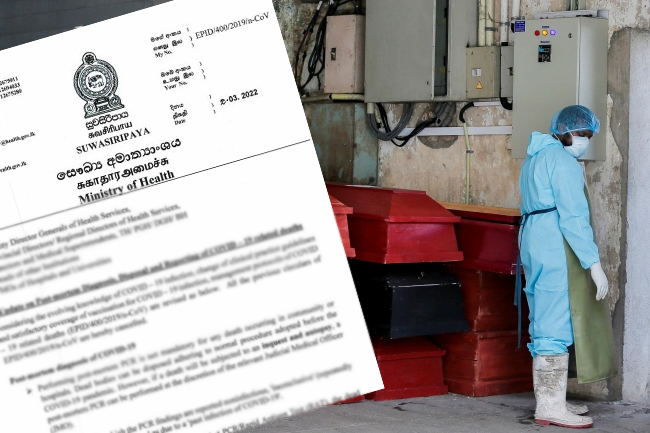Guidelines on post-mortem diagnosis and disposal of Covid victims revised
March 5, 2022 04:28 pm
The Director-General of Health Services, Dr. Asela Gunawardena has issued a new circular with regard to the post-mortem diagnosis, disposal and reporting of Covid-19 victims.
Thereby, the burial procedures mentioned in the previous circulars have been cancelled by the revised guidelines issued on March 02, 2022.
Pursuant to the revised guidelines, the body of a Covid-19 victim is allowed to be handed over to his or her relatives to perform the final rites.
Further, conducting a post-mortem PCR test is not now mandatory for any death in the community or hospital. The bodies of the deceased can be disposed of adhering to the normal procedure adopted before the Covid-19 pandemic.
However, if death will be subjected to an inquest and autopsy, a post-mortem PCR can be performed at the discretion of the relevant Judicial Medical Officer (JMO).
In any death, in which the PCR findings are reported non-infectious, ‘inconclusive’ (repeatedly twice) it should be classified as due to a ‘past infection of Covid-19’.
If a death has occurred after seven days of first PCR/Rapid Antigen Test, the body of the deceased should not be considered a Covid-19 related death. The body should be handed over to the relatives as a normal death, the circular noted.
In a Covid-19 related death, if a cause of death or a probable cause of death can be given by clinicians, a post-mortem examination is not mandatory even if it is subjected to an inquest.
With regard to the disposal of a Covid-19 victim, the Director-General of Health Services stated that the remains will be handed over to the relatives.
The circular also noted that the body should be placed in a leak-proof body bag by healthcare workers before placing it inside a coffin. It is the duty of the relatives to provide a coffin, it added.
The body shall be disposed of within 24 hours by relatives after being released to them by the relevant authority.
The body cannot be transported to any other place (such as funeral parlours or residences) other than the disposal site (cemetery or burial ground).
Further, the body should not be embalmed, the Director-General of Health Services stressed.
Method of disposal (burial or cremation) at any cemetery or burial ground is at the discretion of relatives except for the dead bodies which undergo inquest procedure where the disposal is decided by the magistrate/inquirer into sudden death (ISD) according to criminal procedure code of Sri Lanka.
Disposal of dead bodies has to be done by relatives at their expense. It will not be facilitated by the Health Ministry or any other public institutions hereafter.












